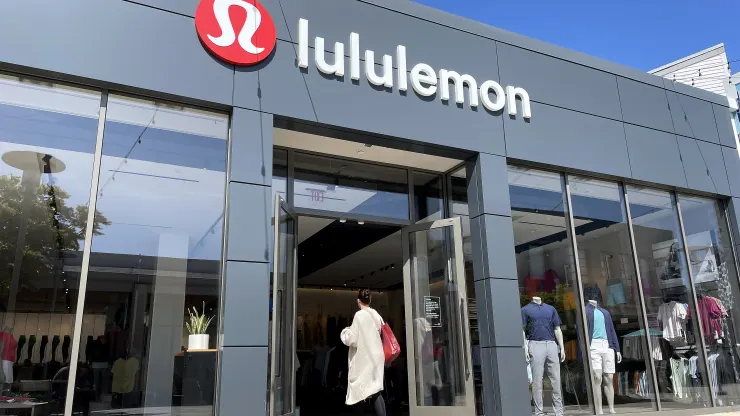Lululemon raised its full-year guidance Thursday after reporting an 18% jump in both sales and profit for its fiscal second quarter, boosted by a 61% revenue spike in China.
The athletic apparel retailer now expects sales to be between $9.51 billion and $9.57 billion for the fiscal year, compared to a previous range of $9.44 billion to $9.51 billion.
Lululemon is expecting profits to be between $12.02 to $12.17 per share for the year, compared to a previous range of $11.74 to $11.94.
For its current quarter, the retailer is forecasting earnings per share of $2.23 to $2.28 and sales of $2.17 billion to $2.19 billion, in line with analysts’ expectations, according to Refinitiv.
Here’s how Lululemon did in its second fiscal quarter compared with what Wall Street was anticipating, based on a survey of analysts by Refinitiv:
- Earnings per share: $2.68 vs. $2.54 expected
- Revenue: $2.21 billion vs. $2.17 billion expected
The company’s reported net income for the three-month period that ended July 30 was $341.6 million, or $2.68 per share, compared with $289.5 million, or $2.26 per share, a year earlier.
Sales rose to $2.21 billion, up about 18% from $1.87 billion a year earlier.
The top and bottom line beats were fueled by strong growth internationally. The retailer saw sales jump 52% in markets outside of North America, boosted by a 61% increase in China. That’s up from 30% growth in the region in the prior-year quarter.
Lululemon’s finance chief Meghan Frank said there was little volatility in the region during the quarter. She described the sales growth as “strong” and “healthy,” even as China’s economy slows with retail sales up just 2.5% year over year as of this July.
CEO Calvin McDonald said both e-commerce and in-store sales are performing “incredibly well” in China.
The retailer now has 107 stores in the country, and of the 35 it plans to open internationally during the current fiscal year, the majority will be in the region, McDonald said.
Sales in North America were up 11%. Meanwhile same-store sales across the global business fell short of expectations: Comparable sales were up 11% in the quarter, compared to an estimate of up 12.1%, according to StreetAccount.
Lululemon has undertaken an ambitious growth plan — its “Power of Three x2” strategy — that calls for sales to double to $12.5 billion by 2026 compared to 2021′s revenue of $6.25 billion. To get there, the retailer has been working to expand its brick-and-mortar footprint and double its men’s and direct-to-consumer revenue.
Sales in the men’s category were up 15% during the quarter, and the retailer opened 10 new stores on a net basis, including its first in Thailand. By the end of the quarter, it had 672 stores globally.
It’s also been working to address a persistent inventory glut, with year-over-year levels steadily coming down. During its second quarter, inventories were up 14% to $1.7 billion, compared with $1.5 billion in the year-ago quarter. The strong sales helped inventories move, as well as lower air freight costs, said Frank.
While turnover rates are still a bit slower than historical levels, the company said it’s in a good position with both the currency and level of its inventories, she said.
Direct to consumer revenue was up 15% but it was a smaller part of Lululemon’s overall channel mix in the quarter. Direct to consumer sales represented 40% of Lululemon’s overall sales, compared to 42% in the year ago period.
Lululemon’s gross margin was largely in line with expectations at 58.8%, compared to the 58.5% analysts had expected, according to StreetAccount.

